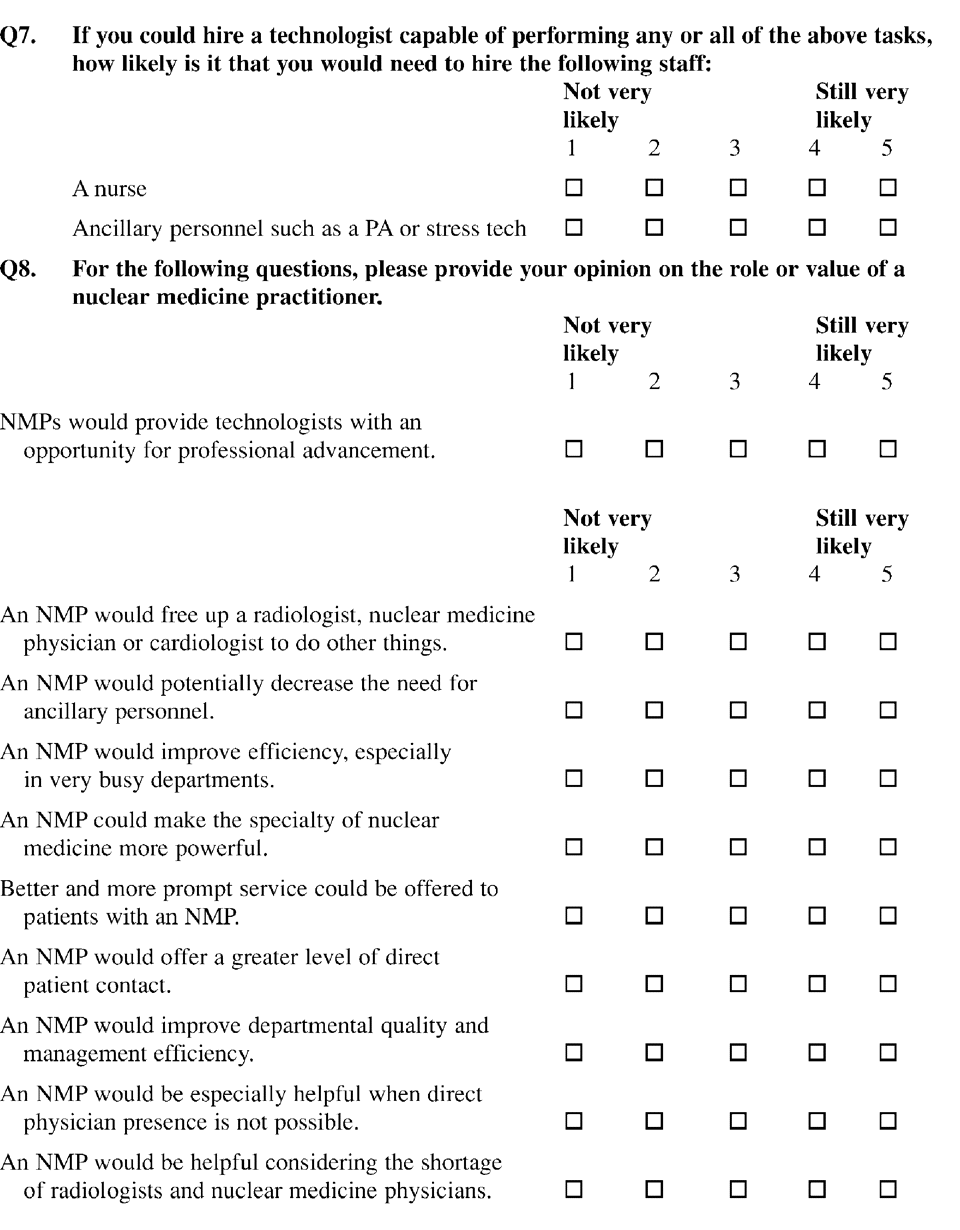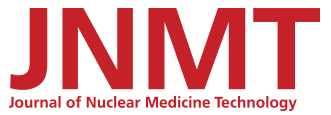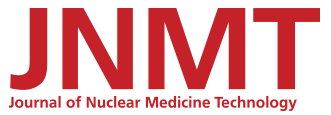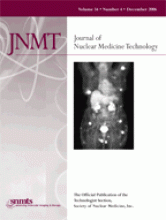Abstract
The development of an educational program and credentialing structure to support and recognize an advanced level of the practice of nuclear medicine technology is now underway. This work parallels the efforts in many, if not most, health care disciplines as they seek to achieve the twin goals of developing enhanced career paths and providing the best possible patient care in an environment where science and technology can run roughshod over concepts taught in the classroom a mere decade ago. Education is key to both goals. A master's level degree in nuclear medicine technology, coupled with an advanced practice credential recognizing both the educational achievement and a level of clinical expertise, will give nuclear medicine practitioners the knowledge and the right to practice their profession at a high level of autonomy, leading to more efficient and higher quality health care services.
To that end the following position paper was prepared by members of the Advance Practice Task Force of the SNMTS and presented to the SNMTS Executive Council and the SNM Board of Directors. In June 2005, the executive council and the board of directors approved a resolution supporting the establishment of a middle level provider in nuclear medicine known as the nuclear medicine practitioner.
DEVELOPMENT OF THE NUCLEAR MEDICINE PRACTITIONER CREDENTIAL
As nuclear medicine technology matures as a profession, an expanded scope of practice is under consideration. According to a study undertaken in 2000 (1) nuclear medicine technologists (NMT) expressed a high level of interest in an advanced practice career pathway. NMTs also indicated that they were already performing many tasks outside accepted practice guidelines and were doing so without the benefit of formalized training. Such activity puts the technologist, the physician, the institution, and most importantly, the patient, at risk for an adverse event.
Workplace characteristics have also changed over time with nuclear medicine procedures performed in a variety of clinical settings. NMTs may work in areas with little physician coverage and make medical decisions outside their area of expertise. As more procedures are performed by other medical specialists, particularly cardiology and oncology, NMTs who work for these specialists are often required to provide a certain amount of medical expertise to compensate for knowledge that the other specialists lack—a level of practice that, in other circumstances, would have been provided by a nuclear medicine physician.
The fact that many technologists have significant work experience represents a unique opportunity for professional growth. NMTs possess a shared bond with medical imaging physicians. They speak a common language and share a deep understanding of medical imaging. Talented NMTs would be ideal candidates to fill positions that provide advanced nuclear medicine services similar to that of a physician assistant (PA) or nurse practitioner (NP). They would have the added advantage of being able to administer radiopharmaceuticals, a task often prohibited to PAs or NPs in licensure states. But without the proper education and training, NMTs lack the regulatory underpinnings of other physician extenders.
To address this situation, the Technologist Section of the SNM (SNMTS) recently completed a physician survey for input on how such a middle level provider, or nuclear medicine practitioner (NMP), might function and how physicians would view this development. The survey, which was completed in April 2005, revealed an overall positive impression by physicians regarding the development of an NMP provider credential. In general, it is anticipated that NMPs will be required to demonstrate a high level of autonomy, technical sophistication and advanced clinical knowledge, and strong critical thinking and decision-making skills. They will be highly capable and motivated professionals, comfortable with the sciences, seeking increased education at the master's degree level.
RESULTS FROM PHYSICIAN SURVEY APRIL 2005
The SNMTS conducted a survey to explore the possibility of creating a middle level provider of nuclear medicine services. The survey questionnaire (Appendix) was developed by Sage Computing, Inc. staff in consultation with SNM staff members and using draft questions approved by SNM staff and members of the Advanced Practice Task Force. A pilot survey was conducted in 2004, and items from that study were used as the basis of the current survey.
The questionnaire administered by Sage was mailed to 1,500 physicians. These potential respondents were randomly selected and are representative of a larger universe of 2,700 individual society members from ASNC, ACNP, and ACR. Almost every state, as well as Puerto Rico, was represented in the sample. The overall response rate was 24.7%.
Demographics of Respondents
Survey respondents were asked to report their specialty area and could select up to six areas alone or in combination. Forty-five percent reported expertise in the area of cardiology and 34.3% reported nuclear medicine (ABNM). One-quarter (25.6%) reported a specialty in internal medicine (ABIM) and 13.1% reported their specialty as radiology.
Survey respondents were asked how long they have been practicing nuclear medicine. One third reported practicing more than 20 years. The average of all responses was approximately 14 years of experience in nuclear medicine. Only 1 in 5 respondents reported that their institution had a nuclear medicine residency program. When asked if they had ever worked with a PA or NP, the vast majority said yes (71.4%).
Proposed Tasks of NMP
Survey respondents were asked their opinion about the usefulness of an NMP in performing various tasks. The survey instrument used a Likert scale of 1 through 5, with 5 representing “very useful” and 1 representing “not very useful.” A “not applicable” option was available for each question as well.
Overall, 72.5% of the respondents thought an NMP would be very useful (5 on Likert scale) or useful (4 on Likert scale) in performing exercise stress tests; 50.7% thought it would be useful if the NMP could read an ECG; and 83% thought having the NMP be ACLS–certified would be useful or very useful.
Eighty-two percent thought an NMP would be very useful or useful in obtaining informed consent; 74% were of the opinion that an NMP would be very useful or useful for taking clinical histories before and/or after imaging procedures. Only 16% thought an NMP would be useful in administering radiopharmaceuticals intrathecally or intraperitoneally; most thought this task was either not applicable (33.2%) or not very useful (27.6%).
When queried about the value of an NMP administering the radiopharmaceutical for sentinel node imaging, 42% agreed that it would be useful or very useful; 30% indicated this was not applicable to their practice.
Three questions were asked regarding NMP interpretation of images. When asked if an NMP should evaluate images and provide a preliminary diagnosis, 20% said this would be very useful and the same percentage said it would not be very useful. Overall, 35% did not seem to favor this task (task rated as 1 or 2) while 38% did (task rated as 4 or 5); 18% were undecided. When asked whether the NMP should evaluate images and simply indicate whether they were normal or abnormal, slightly more seemed to be in favor of this task but many respondents remained opposed. Thirty-one percent rated this task as a 1 or a 2 (not very useful or not useful) and 43% rated the task as a 4 or 5 (useful or very useful). More ambiguity appeared for the task of evaluating images and providing a technical report or preliminary diagnosis to the radiologist. The largest number (23%) rated this task as a 3; 34% thought this task was not particularly useful (1 or 2) and 35% thought the task was useful or very useful (4 or 5).
In response to the question about an NMP ordering interventional pharmaceuticals according to protocol, 62% thought this was useful or very useful. Forty-six percent believed it would be useful or very useful for an NMP to order complimentary diagnostic procedures.
Interest appeared to be strong regarding the role of an NMP in therapeutic procedures. Forty-six percent said it would be useful or very useful for the NMP to review requests and examine patients prior to therapy procedures and monitor post-therapy patients. Nearly one fifth of the respondents indicated this task was not applicable to their practices.
Value of an NMP
Respondents were asked to rate a series of opinions about NMPs based on the question: “Please provide your opinion on the role or value of an NMP.” When asked if “NMPs would provide technologists with opportunity for advancement,” 60.8% reported yes (likely or very likely), while only 12.0% responded not very likely. Similarly, when asked if “An NMP would free up a radiologist, nuclear medicine (NM) physician, or cardiologist to do other things,” 53.0% reported yes (likely or very likely) and only 15.9% said not very likely.
The response to the item, “An NMP would potentially decrease the need for ancillary personnel,” one half of respondents said yes (likely or very likely). This is somewhat inconsistent with the results of a previous question, where only a quarter of respondents said they were unlikely to hire a nurse/PA if a highly skilled technologist were on staff.
Asked if “An NMP would improve efficiency especially in very busy departments,” 61.6% of all respondents agreed (very likely or likely) while only one in 10 said it was very unlikely. Thirty-six percent of respondents agreed that “An NMP could make the specialty of NM more powerful,” but 24.1% dissented with that opinion. On the operational matter “Better and more prompt service could be offered to patients with an NMP,” almost half (47.7%) agreed it's likely or very likely; only 15.3% disagreed with that statement about an increase in service promptness.
Physicians were also asked if an NMP would offer a greater level of direct patient contact. Half agreed and 15% did not agree. Nearly half of all responses (48.7%) indicated that “An NMP would improve departmental quality and management efficiency,” substantiated by only 14.5% who said that it's not very likely. As for whether “An NMP would be helpful when direct physician presence was not possible,” almost 64% agreed (likely or very likely) while only 12% did not agree. Lastly in this series of opinions, respondents were asked their opinion on “An NMP would be helpful considering shortage of radiologists and NM physicians,” and 42.6% agreed it's likely to very likely while 21.9% said it was not very likely.
Other Roles of the NMP
Respondents were asked to register their opinions on a series of seven subquestions about the importance of the role and capabilities of an NMP. Overall, when presented with these statements about NMPs, the majority always rated the role and capabilities as important to very important, (and generally a small minority disagreed). That indicates that if an NMP were present, they would need to have these capabilities and play a significant role in supporting or carrying out the following: lab management, coding and billing procedures, accreditation processes, and research. Following are details of the findings for each area.
First, respondents were asked if “An NMP should be proficient in department or lab management.” More than 70% said that is important or very important. Only 12.4% said not important or not very important. Next they were asked to rate the importance of the statement, “An NMP should be capable of helping a lab receive accreditation.” Over 76% agreed, and only 10% disagreed.
Respondents were presented with the statement, “An NMP should be capable of conducting or assisting with research projects.” Sixty-three percent agreed and only 13% did not agree. When physicians were asked to respond to “An NMP should be very familiar with therapeutic procedures,” 72.8% said it was very important to important, while only 11.5% did not rate it as important.
Asked about whether “An NMP should be familiar with billing and coding issues,” a little more than half (53.6%) agreed it is very important or at least important, and one in five (20.1%) said it was not important.
Education and Training
Stating their opinions on “An NMP should be trained and educated at the master's level,” 52.3% respondents ranked that as important (or very) and a total of 21.1% were of the opposite opinion. Finally, physician respondents were asked their opinion on whether “An NMP should be trained and educated in a manner similar to a PA.” A majority of 71.2% agreed it is at least important; only a total of 11% rated it as not (or not very) important.
Variations Among Physician Respondents
Some basic factors characterizing the physician respondents to the survey could affect their responses. For example, physicians with a nuclear medicine residency program at their institution might experience more academic-type clinical settings and practice patterns and therefore might view the role of an NMP differently than a physician with no local nuclear medicine residency. The responses were analyzed by the following variables: (1) specialty area of respondent; (2) nuclear medicine residency at the institution; (3) prior experience with a PA or NP; and (4) years of practicing nuclear medicine.
When asked, “How useful would it be if the NMP could perform the following tasks?” the cardiology specialists reported much less usefulness for the four tasks: order complementary diagnostic procedures; review requests and examine patients prior to procedures; monitor post-therapy patients; and especially, perform bladder catheterization. However, on the other questions regarding the role and value of an NMP and NMP capabilities, the responses were nearly the same without regard to any respondent specialty. Most response frequencies were only a few to several percent different between cardiology and non-cardiology nuclear medicine practitioners.
The data were analyzed to assess whether physicians responded differently depending on whether or not their institution had a nuclear medicine residency program. Some important differences, statistically significant at the 95% level of confidence, were found. When asked, “How useful would it be if the nuclear medicine practitioner could perform the following tasks?” physicians with residencies rated as “very useful” much more frequently for five tasks (of 16 tasks), than did respondents at institutions without residencies. Those areas were: administer radiopharmaceuticals intrathecally or intraperitoneally, administer radiopharmaceutical for sentinel node imaging, perform bladder catheterizations, review requests and examine patients prior to therapy procedures, and monitor post-therapy patients.
The responses to “Please provide your opinion on the role or value of a NMP,” differed significantly depending on whether a residency program was present. Respondents with residency programs were more likely to respond “very likely” than those at institutions without residency programs on these important factors: NMPs would provide technologists with opportunity for advancement, an NMP would free up a radiologist, nuclear medicine physician or cardiologist to do other things, and an NMP would improve efficiency. In addition, respondents with residency programs reported that it would be very important that an NMP be trained and educated at the master's degree level.
The survey data were further analyzed for differences between respondents who had worked with a PA or NP and those who had not. For most questions, the two groups' responses were much the same, with some notable differences. As for NMPs performing tasks, physicians that had worked with a PA or NP rated as very much more useful the capability of the NMP to perform exercise stress tests and read ECGs. When rating the role and importance of NMP capabilities, physicians who worked with PAs or NPs rated four of seven areas as very important at a more than 10% higher rate than physicians who had not worked with PAs or NPs. These areas were: lab management, lab accreditation, conducting or assisting with research projects, and familiarity with therapeutic procedures. This indicates that those who worked with a PA or NP place more weight on their staff having greater capabilities.
When responses were analyzed for differences due to the number of years of practice, no statistically significant differences were found. Regardless of the length of service, physicians' responses to questions were much the same, whether the question was about NMP roles, value, or capabilities.
EDUCATION OF THE NMP
Nuclear medicine practitioners would be educated at the master's degree level, most likely after several years of experience. The rationale for the master's degree is that this level of education is now mandatory for the NMP counterparts in the health-care arena, the nurse practitioner and the physician assistant. According to the physician survey, a strong interest was expressed in the master's degree level of education as well as in following a PA educational model. Also, regulatory requirements (Medicare) require a master's degree for certain privileges.
According to the physician survey, prior experience as a nuclear medicine technologist is viewed as essential. Forty-three percent of the responders felt that two or three years of experience was necessary before training to become an NMP, and 41% thought five or more years was important.
Technologists who reported a high level of interest in an advanced practice career pathway in the 2000 study indicated educational programs should be configured so that they could be completed while technologists remain employed. In fact, current employment settings will most likely be crucial for educating and training the NMP. New educational models should be explored, including online education and part-time tracks. Tracks should be developed in cooperation with existing radiologist assistant (RA) programs, for dually certified (RT and NMT) technologists who might also choose dual advanced practice (RA and NMP) career pathways. Institutional consortia should be considered as a means of conserving scarce resources.
NEXT STEPS
After appropriate review and approval by the SNM and SNMTS leadership, a model curriculum and associated competencies will be developed. Key stakeholders in the process will include accreditation and credentialing bodies. External bodies to SNM, including other medical and professional associations, as well as regulatory groups, will also play a key role in further defining the knowledge, skills, and privileges of the NMP.
SUMMARY
The concept of a middle level provider of nuclear medicine services, designated a nuclear medicine practitioner in this paper, is supported by two studies of technologists and physicians. It is anticipated that the nuclear medicine practitioner would have attributes parallel to those of a physicians assistant with roles and functions to be defined by advanced clinical competency beyond the technologist level. This new clinical role offers an opportunity for significant career advancement for technologists and would result in nuclear medicine services that are more cost effective and efficient.
APPENDIX: PHYSICIAN SURVEY FOR NUCLEAR MEDICINE PRACTITIONER (NMP)

Physician Survey for Nuclear Medicine Practitioner (NMP)
Conducted by:
Sage Computing, Inc
11491 Sunset Hills Road, Suite 350 Reston, VA 20190
The Society of Nuclear Medicine Technologist section (SNMTS) is exploring the possibility of creating a middle level provider, or Nuclear Medicine Practitioner (NMP), with attributes similar to a physician assistant. This individual would work under physician supervision and would have more advanced clinical skills than a technologist. We need your input to understand how such people might function and how physicians might view this development. We would appreciate you completing this short survey and mailing it back to us in the postage paid envelope included in the package. Please remember that all responses will be kept confidential and we will distribute all results as aggregate data only.
Thank you for your response!
This survey has been made possible through the support of the SNMTS Professional Development and Education Fund's Corporate Friends: Biogen Idec, Bristol-Myers Squibb, Capintec, Inc., GE Healthcare and MDS Nordion
An NMP is defined as a nuclear medicine technologist with advanced clinical skills with roles and functions to be defined by clinical competency and integrated with physician interaction and supervision
Please help us understand the potential role of a NMP by answering the following questions and returning the completed survey in the envelope provided.




References
- 1.↵







